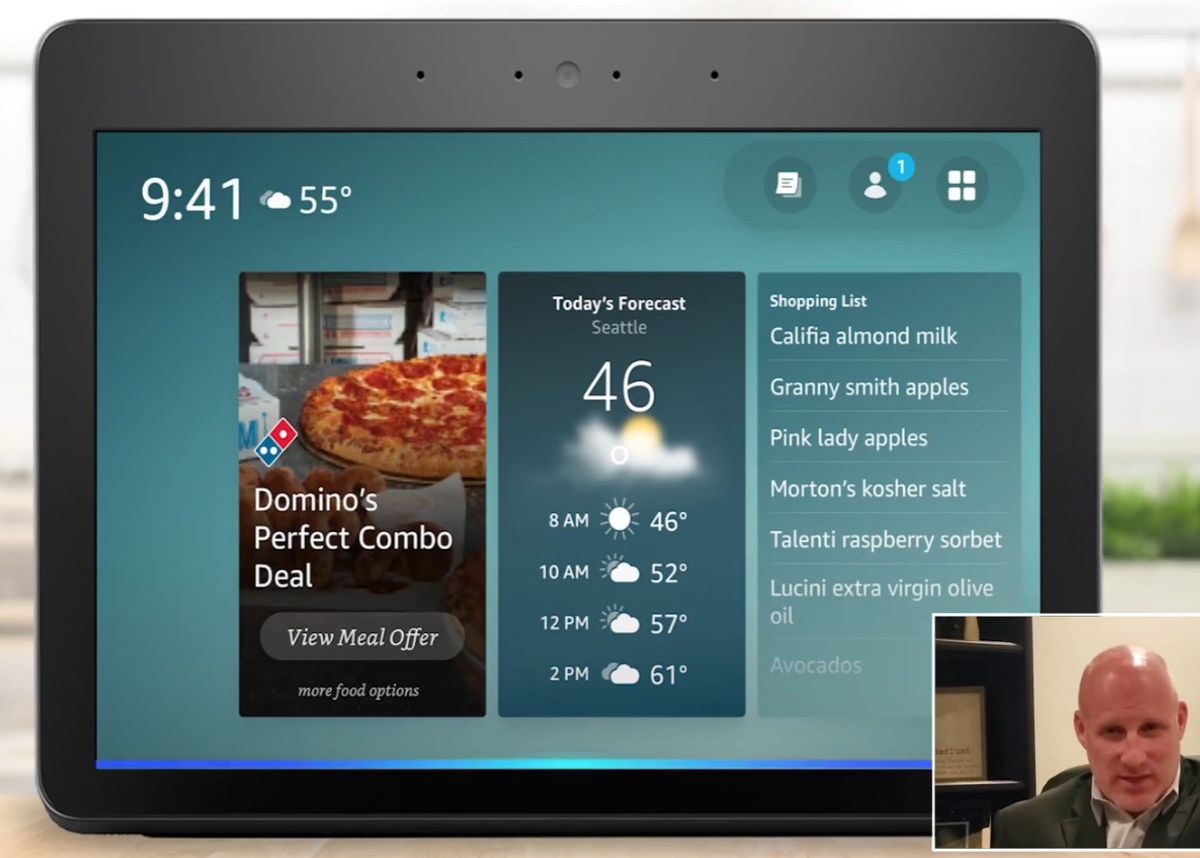Amazon’s Alexa devices are ambient computers, not the kind you use all day. When you do ask your Echo a question or glance at your Echo Show’s diminutive screen, the voice assistant only has a brief chance to impress. Today, Amazon is announcing it’s going to give more of those opportunities to third-party developers — including brand-new widgets and featured skill cards that might take up a chunk of your smart speaker’s precious real estate.
Here’s what to expect from those and everything else the company’s announcing at its Alexa Live event today.
As you can see in Amazon’s mockup above, widgets look pretty much as you might expect. In a blog post, Amazon describes them as “rich, customizable, glanceable, self-updating views of skill content” where you can check items off a to-do list or activate a skill’s functions, without needing to say “Alexa” first. It’s not yet clear how limited they are or if they might effectively be a way to build a touchscreen app for an Echo Show.
Featured skill cards might be slightly controversial, depending on how useful they are. It promotes new Alexa skills on your home screen, even if you haven’t asked for them. It’s not exactly an advertising service, Amazon Alexa Skills VP Aaron Rubenson tells The Verge, not something developers will have to pay for. “It’s open to everybody to raise their hand and say they want to be part of it,” he says, adding that you’ll see personalized results based on other signals you send Alexa. One of the first featured skill cards will be Comedy Central, and Rubenson says he might well see it because he already listens to some comedy in his Alexa Flash Briefing each morning.
But even if you don’t have an Echo device with a screen, you may get more Alexa skills suggested to you soon. Amazon says it’s expanding its name-free interaction toolkit to let skills volunteer to be promoted when you speak phrases like “Alexa, how did the Nasdaq do today?”
“We’re letting developers raise their hand and say, ‘My skill can handle that request,’” says Rubenson. And you agree to use Amazon’s suggested skills, Alexa can pass along your request instead of making you repeat yourself.
While Amazon was the only one that previously profited from physical merchandise sold through Alexa, the company will now let Alexa skill developers sell products inside their skills as well with Alexa shopping actions and get up to a 10 percent affiliate marketing commission from Amazon, too. As expected, you can only sell products listed on Amazon.com, though they don’t need to be your products. (Rubenson couldn’t say whether Amazon would allow skills that are effectively just stores.) Amazon’s also introducing paid skills, so don’t be surprised if you have to pay before using your next Alexa app instead of using an in-app purchase afterward.
While Amazon still doesn’t seem to have attracted rivals Apple, Google, and Samsung to its voice interoperability initiative yet, it does have some news on that front as well. Rubenson says Samsung will have a fridge with both Bixby and Alexa “operating side by side,” and the company’s Alexa Custom Assistant (which lets brands create their own Alexa-powered assistant) will appear in a Verizon smart display where Alexa can handle standard Alexa tasks while the new Verizon assistant can handle requests like checking your wireless bill. Rubenson says they can hand off requests to each other, too.
In addition to those highlights, here’s a quick bulleted list of other Alexa updates that caught my eye:
- Food Skill APIs for “high-quality, food delivery and pickup experiences.” Domino’s Pizza will use it at some point; here’s an example:

- Send to Phone where “customers can start an experience on their Alexa-enabled device, and continue it on their mobile phone.” McDonald’s UK, Twitter, Husqvarna, Iberia Airlines, Cookpad, and Lysol will connect their mobile apps with Alexa skills.
- Event-Based Triggers and Proactive Suggestions: “For example, if a customer is heading out for work, customers could opt in to have a skill proactively suggest that they lock their home.” Whole Foods will launch a “curbside pickup experience” later this year.
- Find My is opening up the “Alexa, Find my” command to more companies with Tile-like device trackers, with Samsung and Remote+ arriving later this year.
- Alexa Device Discovery will be able to discover new categories of devices like printers and smart TVs.
- Alexa Entities now lets any skill developer access Alexa’s knowledge graph for general answers.
That’s not the whole list, mind you: there’s even more in Amazon’s full blog post, which we’ll add to this story once it’s live. In addition, Amazon is announcing today that almost every Echo smart speaker will support Matter, a new ambitious open standard for smart home devices.
The new features are all coming as part of the company’s Alexa Live developer conference today, where it’s seeking to attract the next generation of programmers to build skills for its voice assistant. Amazon says it now has 900,000 registered developers and 130,000 skills (up from 750,000 developers a year ago and 100,000 skills in September 2019), and Rubenson tells us developer revenue has doubled annually, with some skill developers making over $1 million a year.
https://www.theverge.com/2021/7/21/22586033/amazon-alexa-widgets-featured-skill-api-developers-echo-show-screen

